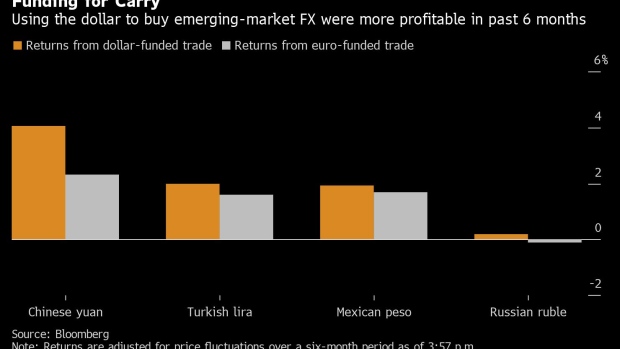Feb 16, 2021
Weak Dollar Meets Wobbling Euro in Battle of Funding Currencies
, Bloomberg News

(Bloomberg) -- Weakness in both the dollar and euro is posing a dilemma for investors about which is the best source of funding for emerging-market carry trades. On balance, the U.S. currency is still the crowd favorite.
The dollar has been sliding since the second quarter of 2020 as the Federal Reserve cut interest rates to a record low and spiraling coronavirus infections pummeled the U.S. economy. The euro has begun a swoon of its own in recent weeks, briefly dropping below the key $1.20 level, as delays in coronavirus vaccinations sets back expectations for a European economic recovery.
“We continue to favor the dollar as our funding currency in emerging-market carry trades,” said Norman Villamin, chief investment office for wealth management in Zurich at Union Bancaire Privee, which oversees the equivalent of $166 billion. “Though the euro has weakened on the back of concerns about vaccine rollouts of late, we expect this is temporary and will reverse as vaccine rollouts accelerate on the continent.”
The challenge in seeking the best funding currency comes as emerging-market central banks start to signal tighter monetary policies as their economies recover from the coronavirus pandemic. The hawkish pivot should help breathe life into carry trades, which have languished during a period when yields have been at rock bottom around the world.
Both the dollar and euro have been losing ground versus their developing-nation peers. The U.S. currency has declined versus 17 of 22 emerging-market currencies in the past six months, while the euro has dropped against 14 of the same group this year.
A strategy of borrowing dollars and investing in a basket of 10 emerging-market currencies at the start of this year would have returned 1.6%, according to data compiled by Bloomberg. A similar trade funded in euros would have already gained 2.3%.
Below are a selection of views from investors and analysts:
Citigroup -- Favors Dollar
- Citigroup Global Markets Inc. prefers the dollar to fund its emerging-market carry trades. History shows the greenback has tended to weaken more than the euro during periods of global recovery, according to strategists led by Dirk Willer in New York
- Even though the U.S. economy is likely to grow faster than Europe’s, this may not be enough to cause the dollar to strengthen, as an analysis of three previous periods of U.S. economic outperformance showed the greenback has tended to weaken even if the U.S. rebounds the most, they wrote in a research note this month
Danske -- Favors Euro
- Danske Bank A/S says the euro will weaken due to the uneven pace of recovery between the European Union and the U.S., and also due to the potential for China to start tightening its monetary policy as its recovers from the pandemic. That may impact demand for goods from Germany, which counts on China as its third-biggest export market
- Danske predicts the euro will weaken to $1.16 over the next 12 months from its current level of around $1.2150
JPMorgan -- Favors Euro
- JPMorgan Chase & Co. is telling its clients to wind back their dollar funding positions and move into more euro ones amid rising U.S. Treasury yields
- We “regard the renewed momentum in nominal yields as a cautionary signal to cover the USD-funding leg of their pro-cyclical trades and to rotate more fully into outright EUR-funding,” strategists including John Normand in London and Daniel Hui in New York wrote in a research report this month. One of the trades they recommend is using 100% euro funding to invest in the Russian ruble
Aviva -- Likes Both
- Aviva Investors says it is keeping the dollar as its core funding vehicle for carry trades, but is starting to see some benefit in using the euro as well
- The dollar is still set to decline because valuations are elevated and it typically weakens in an economic recovery, while it faces challenges from the U.S. fiscal and trade deficits, said Stuart Ritson, a money manager for emerging-market fixed income at Aviva in Singapore
- At the same time, “we do tactically adjust funding, and at present have increased the size of the euro-funding component to protect against near-term dollar appreciation,” he said
©2021 Bloomberg L.P.